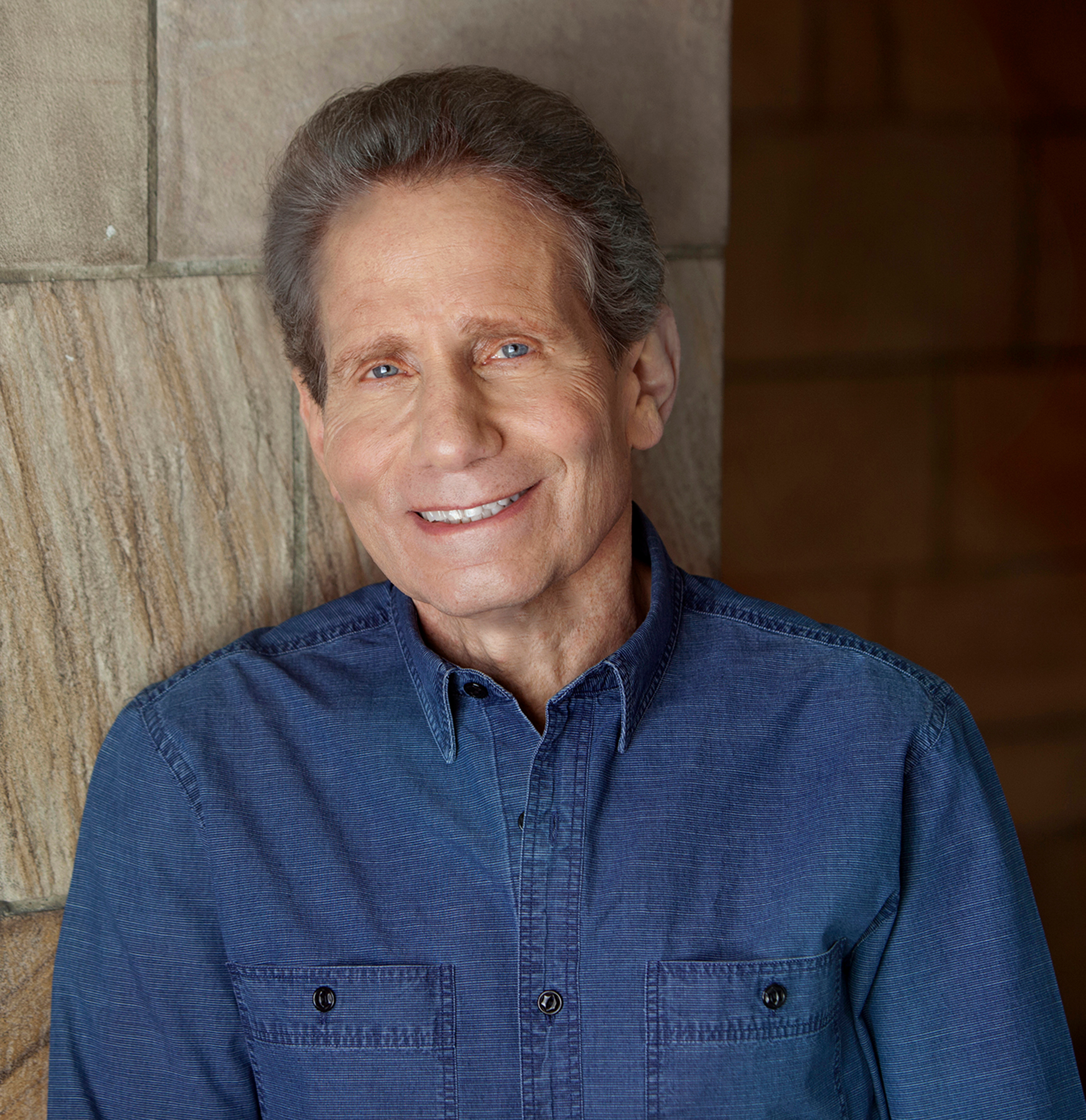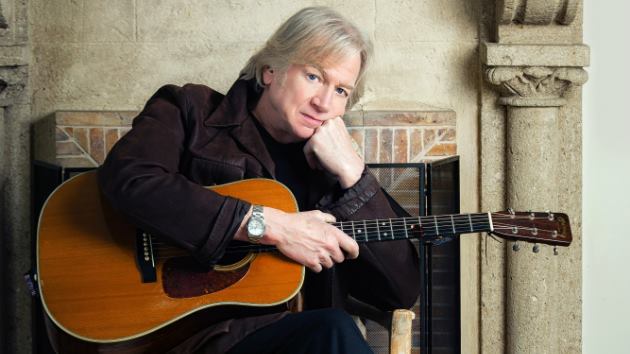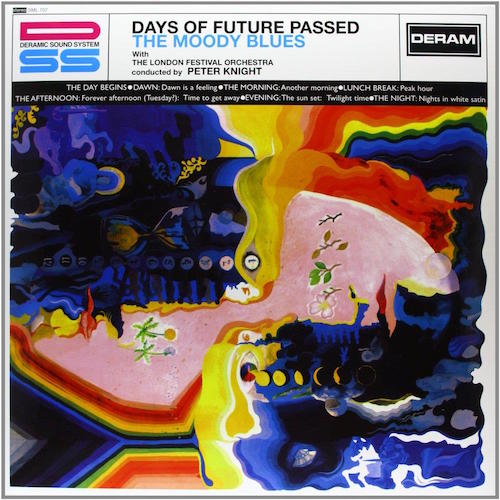
When the Moody Blues recorded Days of Future Passed in 1967, it marked the first time a rock band had fused their sound with a symphony orchestra. But the tale of its unusual recording process and its lack of initial success, is not widely known. The “concept” album without breaks chronicles a day in the life of “one guy,” says Justin Hayward, who wrote the album with fellow Moody Blues members Graeme Edge, John Lodge, Mike Pinder and Ray Thomas, and Peter Knight, a musical arranger, conductor and composer.
The album was only a modest hit in the U.K., reaching just #27 on the sales chart. A single, “Nights in White Satin,” only made it to #18 there, with no success in the U.S. A follow-up single, 1968’s “Tuesday Afternoon,” made it to #24 in the U.S.
It wasn’t until five years later, after the group had a series of Top 30 singles including “Question” and “The Story in Your Eyes,” that the world truly discovered the album and single.
Listen to 1971’s “The Story in Your Eyes,” written by Hayward, who also sings lead vocals
Dennis Elsas is, as many Best Classic Bands readers know, one of the most respected album rock air personalities in the nation. From a quarter-century-plus stint as a DJ and music director at WNEW-FM to his endeavors today as afternoon drive host at the esteemed WFUV and as host of his weekly Beatles talk and “call-in” show, “Fab Fourum,” heard exclusively on the Beatles Sirius/XM Channel (18) plus weekend shifts on Sirius/XM’s Classic Vinyl Channel (26), he has earned the regard of listeners and artists alike. Dennis occasionally presents his Rock ‘n’ Roll Never Forgets live multimedia show, a real treat that greater New York metro area rock fans should not miss. He celebrated his 50th anniversary on-air in 2021.

Best Classic Bands is pleased to be publishing excerpts of many of his interviews with classic rock legends as a regular feature: The Dennis Elsas Conversation, including ones with Robert Plant, John Fogerty, Gregg Allman and Bill Wyman.
This interview that Elsas did with Justin Hayward on the process that led to the recording of Days of Future Passed is from 1996.
Dennis Elsas: Days of Future Passed was certainly not like any rock album ever and had the strongest classical influence of any popular album to date. You recorded with an orchestra called the London Festival Orchestra, which wasn’t really an orchestra, were they?
Justin Hayward: No, we made the name up. (Laughs.) But everyone says “I remember seeing that orchestra; they were great.” They were just a bunch of gypsies, what they called string players in London at the time. They were made up from a few different orchestras; they were great players. But the most important thing about that was Peter Knight who orchestrated and arranged the classical parts of the record was in my opinion the greatest romantic string arranger of the era. He was an inspiration to us. His work on the album will stand forever.
DE: Weren’t you originally not going to record Days of Future Passed? Wasn’t there a record company gimmick going on where they wanted you to test some new sound and work with an orchestra and almost do a traditional classical album?

JH: They were launching a label called the Deramic Sound System later to become Deram and every recording was in stereo—not just remastered later in stereo, like the Beatles—but actually recorded with a wide stereo sound, everything in its proper stereo place. Stereo then was confined to classical music and they wanted to demonstrate stereo could be as interesting for rock and roll as it was with classical.
So we didn’t have a recording contract and they asked us if we would do a rock version of Dvorak’s “New World Symphony” and we met Peter Knight. We saw this as an opportunity. Our aspirations were only purely arty and hope to get reviewed in the Guardian arts section.
We had this whole stage show that we were already doing—a concept stage show—about the day in the life of one guy. And we met Peter Knight and the [Decca Records] executive Hugh Mendl, and said we’d love to do this because it’s our only chance and we don’t want to do Dvorak because it’s so beautiful that it doesn’t need doing in the rock and roll vein. But we’ve got all of these songs. Peter Knight said: “Why don’t I take your songs, take the melodies and themes from them and arrange them classically and I’ll play in between the gaps where you play and the record company will still have their demonstration of rock music in stereo for the first time.”
And that’s what we did. And we called it Days of Future Passed and delivered it to the company. They put it out and it became a kind of cult record through the ‘60s and eventually made it to the top of the charts in 1972.
Related: Our Album Rewind of … Future Passed
Hayward was born October 14, 1946. Listen to Elsas’ entire conversation with him here.
The Moody Blues have sold a reported 70 million albums worldwide. Days of Future Passed was celebrated with an expanded 50th Anniversary Deluxe Edition in 2017. After years of being ignored by the Rock and Roll Hall of Fame, the Moody Blues were inducted as part of the Class of 2018.
Related: Our review of a 2018 Hayward solo concert
- Dan Fogelberg Interview: ‘Same Old Lang Syne’ - 12/31/2023
- The Inside History of the Electric Light Orchestra - 11/25/2023
- Donovan on ‘Season of the Witch’: ‘The Spookiness Was Real’ - 10/31/2023


3 Comments
Did enjoy the production that went behind making Days of Future pass,with Justin Hayward. They are still so talented, together or more recently touring with other bands.
The duo of Haywwod and Lodge were a rocking pair together. I cannot believe it took till 2018 to give them recognition in the Rock and Roll hall of fame. What was the delay,? talent exuded from all the members. I saw them live in the early 80’s, when Grahme was still around. Just so much to offer, multi musical genius.
Luckily Lodge was touring last summer with his own band. I quess the anniversary album is what we will have to look forward to.
Just so much meaningful & touching (emotionally, philosophically, provocatively & spiritually) music from a bunch of truly nice people. I had the chance to meet them after a number of shows from ‘86 on….never once a tantrum or foul words, always fine British gentlemen. Thank you Justin, Michael, John, Ray & Graeme!
I was a teenager in New York City in the 70s and the radio was always tuned to WNEW. Dennis has a great radio voice. The other guys were awesome as well Scott Muni, Vince Scelsa, Dave Herman, etc. such a great station. I remember hearing Dylan blood on the tracks, the new WHO album who are you in its entirety. Those were the days